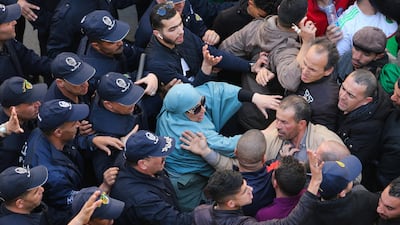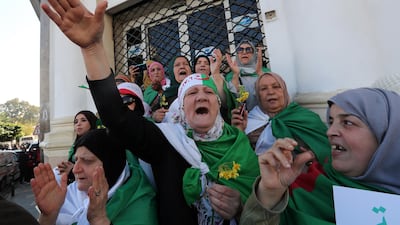Last month, Algeria set November 1 as the date for a referendum on a new constitution. The announcement from President Abdelmadjid Tebboune’s office came after months-long protests demanding political and economic reforms.
The draft for the new constitution, which includes proposals made by a committee of experts that would be ratified by Parliament before being presented to the public, is touted to give the legislature more powers and the country’s democratic aspirations a big boost. However, disappointed by previous referendums falling short of public expectations, and disillusioned by the government’s continued crackdown on protesters and journalists, ordinary Algerians are not holding their breath.
Indeed, this referendum is already a no-go in the eyes of many critics, for a simple reason. They view the process of drafting the new constitution, which began in December 2019 following the election of President Tebboune, as a smokescreen. They also believe that the new document, which will be ratified by Parliament on a yet-unspecified date, will only serve to keep the old, military-dominated regime in power and maintain the status quo.
Reactions to the announcement from the popular Hirak protest movement have been swift – and they are not buying it. Many activists have taken to social media to reject the referendum, demanding instead that the draft contain more radical reforms that would entail an overhaul of the country’s governance system and the removal of the old guard. They would also include the delivery of justice against those individuals allegedly involved in embezzlement and political corruption but seen to be close to the regime.
The Hirak movement began in February 2019, when the then president Abdelaziz Bouteflika – who had been in power for nearly two decades – decided to run for a fifth term. Despite his resignation two months later, protesters returned to the streets week after week for months, demanding the aforementioned reforms, which they do not believe the establishment is interested in enacting.
At the core of the Hirak’s cynicism is a lack of trust in the leadership and its agenda. The establishment’s repeated attempts to block the media have not helped either.
According to the National Committee for the Release of Detainees, an independent human rights group in the country, the government seems determined to squelch dissenting voices. A number of renowned journalists have been handed prison sentences for either voicing their opinion, or simply reporting about the Hirak protests without bias.
Said Boudour is a journalist, human rights advocate and member of the Algerian League for Human Rights. He is internationally known for covering the thorny issue of migrants from the Sahel now living in Algeria. It was his reporting of a corruption scandal that forced the previous government to dismiss General Abdelghani Hamel, its police chief and one of the pillars of the regime. Last year, a court in the western city of Oran ordered the detention of Boudour for “undermining the morale of the army”.
Last month, another journalist and political activist, Abdelkrim Zeghileche, criticised the judicial system on his Facebook page. Zeghileche was charged with “threatening national unity” by a court in the eastern city of Constantine and sentenced to two years in prison.
The government has also cracked down on television networks and social media platforms. Numerous news websites have been blocked. Authorities have admitted to blocking two online independent media outlets – Maghreb Emergent and Radio M Post – without prior notice. Algerie Telecom, the state-owned telecom operator, has cut access to news sites seen to be critical of the authorities, including the French-language Tout sur l’Algerie and Interlignes.

The government’s seemingly contradicting voices have, meanwhile, confounded the public.
While campaigning for the new constitution in April, President Tebboune reiterated his pledge to set up a “second Algerian republic” based on “true democracy and rule of law". Just last week, Ammar Belhimer, the Minister of Communication, guaranteed that authorities would respect “everyone’s freedom of opinion and expression”. Yet, members of the Parliament’s lower house, after debating the Penal Code, passed a series of amendments to punish any actions that are deemed detrimental to “national unity and public order”. Shortly after, Minister of Justice Belkacem Zeghmati asserted that “any publication or website which does not comply with the new regulations would be liable for prosecution”.
It is important to remember that it was Mr Tebboune, who served as prime minister for three months under Mr Bouteflika, who had been pushing for a new constitution that would curtail the president’s authority and guarantee the separation and balance of powers. But clearly, the establishment is not speaking with one voice.
The referendum date has been intentionally set to coincide with the anniversary of the onset of Algeria's 1954-1962 war of independence from France. For the powers that be, it is symbolically meant to be the birth of the second republic. Yet, it is worth noting that the constitution has been amended numerous times since independence in 1962, including during Bouteflika’s presidency, when it had been rewritten and amended to suit his needs and those of the power-brokers around him.
Meanwhile, as the government prepares for the referendum, demonstrations have petered out. Authorities had banned all gatherings since March in their effort to limit the spread of Covid-19. But activists maintain that the Hirak is not over by any means. It is, in their words, simply adjourned because of the pandemic.
A coalition of anti-government associations and political parties that call themselves the Forces of the Democratic Alternative have urged ordinary Algerians to “stay mobilised but vigilant in order to engage forcefully in the resumption of peaceful protests” when the lockdown is lifted.
It is little wonder, with all these developments, that the noise around November’s referendum has fallen on deaf ears in the public square.
Dr Abdelkader Cheref is an Algerian independent scholar in the US





















